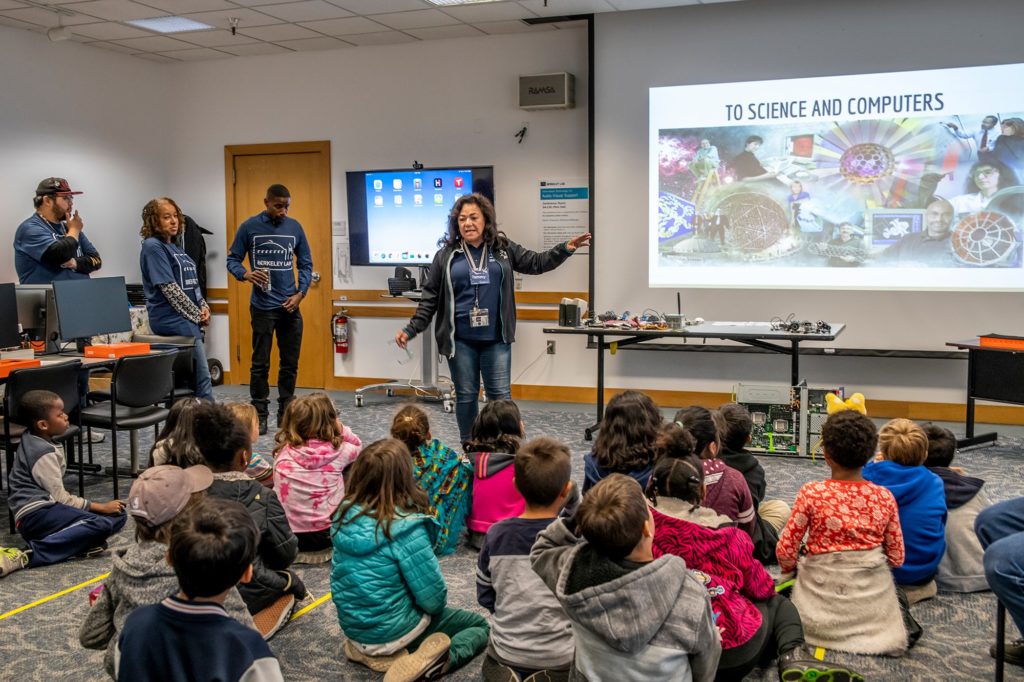How Grade School Peoria Helps Students Develop Essential Life Skills
Wiki Article
Elements to Take Into Consideration in Picking Independent School: Comprehending What Each Organization Needs To Deal for Your Child's Growth
Choosing a private school for a kid entails mindful consideration of multiple variables. Moms and dads need to analyze the scholastic educational program and teaching philosophies of different institutions. They must additionally discover extracurricular tasks that can enhance their kid's experience. In addition, understanding the college's culture and values is vital for placement with family members ideas. As economic ramifications play a considerable function, it is essential to weigh tuition prices against readily available scholarships. Exactly how do these elements shape a youngster's growth course?Academic Curriculum and Training Approach
When selecting a personal college, comprehending the academic curriculum and mentor approach is vital, as these elements significantly influence a kid's instructional experience. Moms and dads ought to explore the school's approach to training and the topics offered, as this can vary considerably among establishments. Some institutions may take on a conventional curriculum concentrated on core subjects, while others could stress project-based understanding or interdisciplinary studies.Additionally, the training ideology can form class dynamics and pupil engagement. Schools that focus on a student-centered approach frequently foster vital reasoning and partnership, while those with a much more structured atmosphere might concentrate on technique and fundamental skills.
After-school Activities and Enrichment Programs

Importance of Diverse Activities
While academic excellence is typically prioritized in exclusive institutions, the value of diverse activities, consisting of after-school activities and enrichment programs, can not be overstated. These activities play a crucial duty in a kid's holistic growth, using chances for creative thinking, vital thinking, and team effort. Participating in different searches allows students to explore their passions, discover brand-new interests, and establish essential life abilities, such as time management and self-discipline. Additionally, diverse activities can promote a sense of belonging and neighborhood, boosting the total college experience. By taking part in clubs, sports, and creative ventures, trainees not only enhance their education but also create remarkable experiences that add to their individual development. Diverse tasks are integral to cultivating well-rounded people.Influence On Social Abilities
How do extracurricular activities and enrichment programs influence a kid's social skills? These programs supply essential possibilities for kids to communicate with peers outside of the typical class setting. Engaging in sporting activities, arts, or clubs promotes team effort, conflict, and communication resolution. Children discover to browse diverse social atmospheres, improving their capability to form friendships and create compassion. Additionally, taking part in various tasks urges self-confidence, as youngsters take on brand-new difficulties and responsibilities. As they collaborate on tasks or compete in groups, they additionally gain important experience in management and collaboration. Eventually, an abundant variety of extracurricular offerings contributes significantly to a child's social growth, preparing them for future interpersonal interactions in both individual and academic contexts.School Society and Worths
Comprehending the institution society and values is essential for moms and dads evaluating personal education options, as these components substantially affect a kid's total experience. Each establishment symbolizes unique philosophies, traditions, and social norms that form students' every day lives. For example, a college that stresses inclusivity may cultivate a supportive environment, motivating youngsters to develop empathy and respect for diverse histories. On the other hand, organizations that focus on scholastic excellence might develop an affordable atmosphere, encouraging students to aim for high success.The placement of a school's values with a household's beliefs can boost a youngster's feeling of belonging, strengthening positive behaviors and perspectives. Moms and dads ought to examine the school's goal statement, evaluate its disciplinary policies, and observe pupil communications to gauge the pertinent culture. Ultimately, a college's society and worths substantially impact not just scholastic success however also individual development, gearing up kids with vital life skills for their future.
Course Dimension and Student-Teacher Proportion
Course size and student-teacher proportion play a vital role in the instructional experience supplied by private institutions. Smaller classes frequently lead to enhanced private interest, cultivating much better student interaction and understanding. Study suggests that these variables can considerably impact finding out outcomes, making them important factors to consider for parents.Advantages of Smaller Sized Classes
Smaller sized course sizes substantially enhance the academic experience by fostering extra customized attention from teachers. In these atmospheres, instructors can tailor their direction to satisfy specific pupil requirements, enabling a deeper understanding of the material. With fewer pupils, instructors can extra conveniently recognize those who might be battling and supply immediate support. This close interaction can grow more powerful connections between trainees and educators, developing a helpful environment for discovering. In addition, smaller classes frequently promote greater involvement, as students may feel extra comfortable voicing their concerns and ideas. This dynamic urges collective learning and enhances total class involvement. Inevitably, the advantages of smaller classes add extremely to a well-shaped educational experience that focuses on student growth and development.Influence On Discovering Outcomes
The advantages of smaller sized classes expand past customized focus, significantly influencing learning results. Research study consistently reveals that a lower student-teacher proportion cultivates improved involvement, allowing instructors to customize instruction to specific requirements. This atmosphere motivates active participation, critical thinking, and deeper understanding of the material. In smaller sized settings, instructors can much more properly identify and address learning gaps, leading to boosted academic efficiency. Private School. In addition, students often really feel more comfy sharing their ideas and asking concerns, which can better enrich the knowing experience. On the other hand, larger course dimensions might limit communication and feedback, possibly hindering trainee growth. Therefore, when assessing exclusive institutions, family members must take into consideration class size and student-teacher proportions as considerable variables affecting their youngster's educational successCommunity Interaction and Parental Involvement
Just how can area involvement and parental involvement improve the instructional experience in exclusive colleges? These aspects play a necessary function in enriching the learning environment. When parents proactively take part in school activities, they foster a feeling of belonging and assistance amongst trainees. This participation can take different kinds, such as offering for events, attending conferences, or joining committees, which not just strengthens the school neighborhood yet likewise enhances communication between families and teachers.Community interaction extends this support by linking the college with local companies, services, and cultural establishments (Private School). Such collaborations supply pupils with special knowing possibilities, consisting of teaching fellowships and workshops, which add to their general growth. Furthermore, Recommended Site schools that prioritize these connections typically produce an even more inclusive environment, permitting diverse perspectives to be shared. Eventually, community involvement and adult involvement serve to produce a collective and helpful setting that adds positively to pupils' academic and social success
Financial Considerations and Scholarships
Maneuvering the monetary landscape of independent schools can be an intricate process for family members. Tuition prices differ substantially, typically influenced by variables such as place, facilities, and the school's credibility. Families have to examine their financial situation, considering not just tuition however also click for more added costs like uniforms, charges, and after-school activities.Many private schools provide scholarship programs targeted at bring in diverse student populations - Grade School. These scholarships can make and alleviate financial problems quality education and learning easily accessible to family members with differing earnings degrees. It is necessary for parents to make inquiries about the schedule of need-based and merit-based scholarships and recognize the application processes involved
Additionally, some schools provide flexible payment plans that can reduce immediate economic pressures. By examining all economic aspects and discovering scholarship opportunities, families can make educated choices that line up with their budgetary restraints and academic goals.
Often Asked Inquiries
Exactly How Do Schools Assistance Trainees With Discovering Disabilities?
Schools support trainees with learning disabilities with customized education and learning plans, specialized mentor techniques, and extra sources. They frequently provide customized treatments, access to support personnel, and comprehensive environments to cultivate emotional and scholastic growth.What Is the School's Strategy to Discipline and Behavior Management?
The institution's technique to technique and behavior management stresses positive support, clear expectations, and corrective techniques. Personnel actively involve trainees in conversations regarding behavior, fostering a helpful environment that urges personal responsibility and responsibility.Just How Do Colleges Take Care Of Trainee Changes, Such as Relocating To Higher Qualities?
Institutions commonly supply organized support during trainee adjustments, consisting of positioning programs, mentorship chances, and customized academic planning. These actions aim to alleviate anxiousness, promote modification, and guarantee pupils are prepared Bonuses for the obstacles of greater grades.What Are the College's Plans on Modern technology Usage in the Class?

How Do Colleges Assess Trainee Development and Offer Responses to Parents?
Schools assess student progression via regular analyses, consisting of examinations, tasks, and class engagement. Responses is given to parents using record cards, parent-teacher meetings, and on the internet portals, making sure constant interaction concerning each kid's academic growth.
Report this wiki page